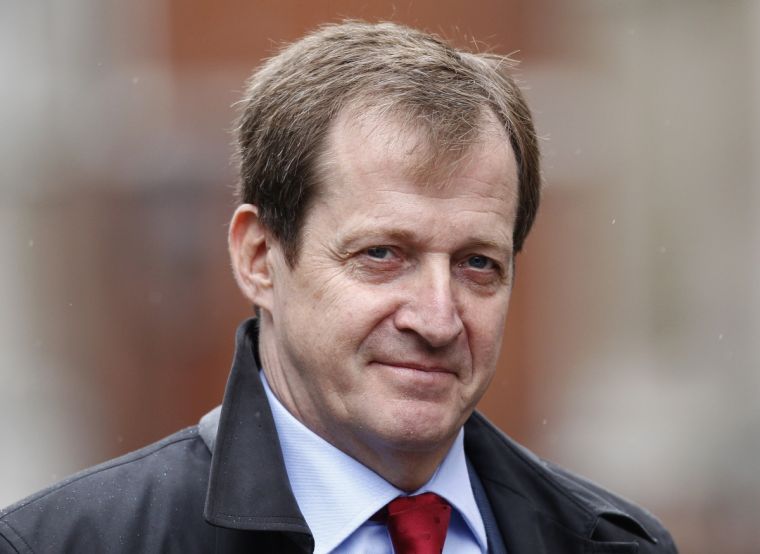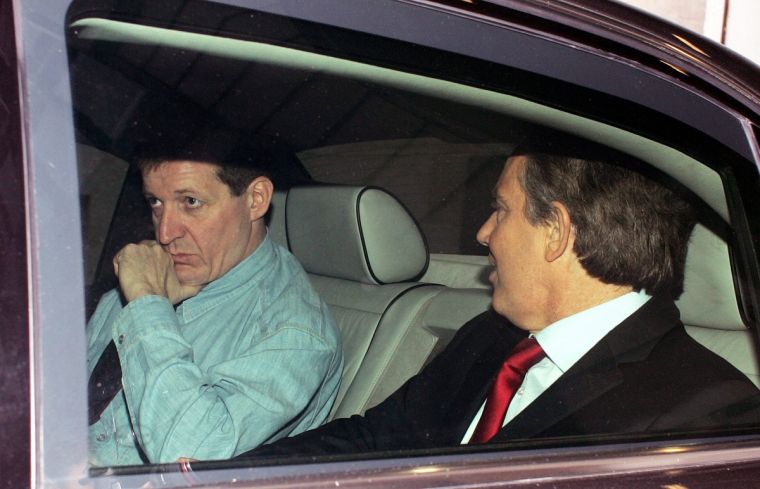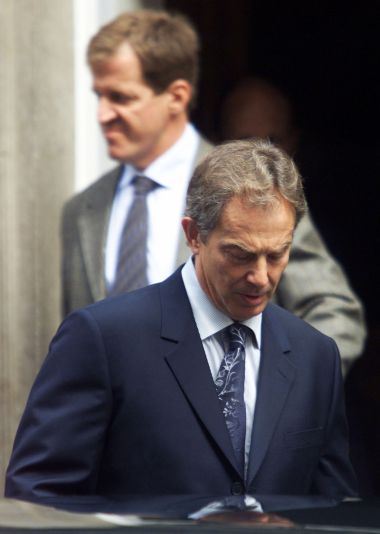Alastair Campbell: I may do God

Alastair Campbell is tired, angry and depressed. Slumped horizontally on his sofa at home in north London, he describes how he feels after Britain's - or rather England's - decision to leave the EU, against which he fought so hard behind the scenes.
"How do I feel? I feel very, very..." A big sigh. "I feel tired. I do feel quite depressed about it," he says. "I do feel actually very down about it. I do feel anxious about where it's going to lead. I feel sad...I feel dreadful about it."
Speaking to Christian Today as his beloved Labour party appears to be imploding, this is Campbell's most personal interview, in which the well-known atheist reveals that he may one day come to faith. "There's a part of me that would love to have it," he says, adding that his old boss Tony Blair is convinced he will come round.
Campbell, a former journalist whom Blair hired in 1994, famously told one American reporter interviewing Blair that "We don't do God". Yet later, he describes having spiritual experiences and what he might pray for were he a believer.

First however, the post-Brexit politics.
A passionate Anglo-Scot Unionist, Campbell says of his family that, "We seriously are now talking about moving to Scotland" and praises Nicola Sturgeon, Scotland's nationalist First Minister, as the only leader in Britain getting a grip at the moment.
"I certainly feel I have more in common with Nicola Sturgeon's Scotland than with Boris Johnson's England. I feel I have more respect for her leadership than for [embattled Labour leader] Jeremy Corbyn's. In fact, I have more respect for all three of the Scottish women leaders than for the leaders down here." Campbell is referring to Sturgeon, the Scottish Labour leader Kezia Dugdale and the Scottish Conservative leader Ruth Davidson. "I feel British and Scottish. I don't feel English. And I just think Scotland is just really exciting at the moment. And its politics are lively and engaging...And I certainly think Sturgeon is justified to have a second [independence] referendum and I think there will have been a shift. I've always felt British, Scottish, northern, European - in that order. But I think the European thing has gone up. I'd be very happy to be Scottish and European. I'd hate not to be British...But I can see Scotland going."
For Campbell, politics are not a game, and he is vitriolic about Boris Johnson.
"What I find so nauseating today is that for Johnson it still is a game." Campbell helped David Cameron, Cameron's spin doctor Craig Oliver and George Osborne coordinate the Remain campaign, and the outgoing prime minister grew on him.
"I think the way [Leave campaigners] Johnson and [Michael] Gove did what they did was disgusting. Whatever else Cameron is, he doesn't seem to me to be a horrible person. I did [have dealings with Cameron] and I had a lot of dealings with Craig and Osborne. I really felt that he fought for it... Cameron grew on me in that I actually did feel he was kind of putting his whole being on the line for this."
Campbell, whose part-published diaries chart the New Labour years and much else, knows a thing or two about divisions at the top of political parties but says that the behaviour of Johnson and Gove towards the outgoing prime minister puts the famous battles between Tony Blair and Gordon Brown in perspective. "I think Cameron has been completely shocked by a sense of two people who he's never really heard saying so much of the things they've been saying in the last few years, now making that such a thing and bringing him down. It kind of puts Tony and Gordon in its place."
Asked whether the result can somehow be reversed, Campbell says it is "not over" and that there will be a "backlash". "I certainly don't think this is over. I mean yes, everybody's got to say...we'll make it work. Everybody has to say the people have spoken and politicians now have to exercise their will, but one of the reasons why I think referendums in our country are so dangerous is that we're a parliamentary democracy - it is one of the things that these people are meant to care about - we're a representative democracy...I mean the inconsistency and they lying [of the campaign]. So I do feel angry. And also I'm not buying this idea that we all have to say it's all over."
Campbell does not believe Johnson will end up as prime minister, but he says that the Tory is in for a rude awakening if he does. "The reality is that Boris Johnson has never done detail, and this is going to be about detail so microscopic and so difficult, and he's dealing with people now who are really, really serious people...As the details emerge, and people realise that this is the most complicated divorce there has ever been, I think they are going to start to say, well hold on a minute, nobody told us any of this. And I think there will be a backlash."
And he accuses Johnson of unleashing racism on the streets. "I suspect there is quite a lot of low level racism in Britain all the time but it has been unleashed. It has been unleashed by our newspapers, by Boris Johnson, by [Nigel] Farage. Now to be fair to Farage, it's kind of what he does. You know, he's at least had a wholly consistent position and style of politics which I totally disagree with, but at least he's consistent. The ones I really do have difficulty with are Johnson and Gove who just flipped."
Campbell has always had a strong sense of what he believes to be right and wrong. On faith, he says something is "holding me back" from believing in God. But he begins by explaining that the now-cliched "We don't do God" line was "totally misunderstood".

"Now, maybe the reason it has become one of those things is because people are aware that Tony is a believer and I'm not. And also people are aware, not least through the diaries, that I always argued against Tony talking about it. Now, I think there is an argument to be had about that. And I do think that actually we're very different to America. I think in America politicians have to do 'God bless America', they have to be seen coming down the steps of churches on a fairly regular basis, clutching the Bible. I think in Britain it's very, very different. So my view was always the public don't like it. I think that now that Tony's out I think it's good if he talks about it: both his faith and these issues of faith. Because I think where he was definitely onto something: I can remember when - this is in the next volume of my diaries - after I'd left and I was talking to him about his future, he was always saying the big issue is going to be about this kind of inter-faith dialogue...I always thought he was onto something."
Campbell defines himself as being "a pro-faith atheist": "I don't disrespect anybody's views as long as they are not violent and extreme. I have got people in my family who are very very deep believers - my siblings, other relatives, friends - and I've never ever disrespected it. I worry that the Dawkins view of it all is very 'we're superior to you'."
Campbell says of his own relationship with faith: "There's a part of me that would love to have it. Something's holding me back."
Yet extraordinarily, this supposed life-long atheist describes having deep spiritual moments. "I do find myself now as I get older having these sort of moments when I really feel quite deeply spiritual."
He describes being in Scotland, preparing to give the eulogy at his old friend Philip Gould's funeral in 2011. "And it was like - it was just so strange - I saw these birds, and it was - ah - it was a really deep spiritual moment."
The day itself, at the Anglo-Catholic church All Saints Margaret Street in London, is a blur. "I've got to be honest, I'd taken so much diazepam that day, that I can hardly remember it at all. Bizarrely the one thing I can remember is Michael Gove nodding furiously while I was speaking. Isn't that weird?"
He pauses and then laughs when asked if he rules out coming to faith, and reveals that Blair is among those convinced he will come to believe. "I just don't know. My sister [Liz, 57] is convinced I'll get God. Tony is convinced I'll get God...Just like going into politics - something's holding me back. But I'm not hostile to Christianity - not at all. Today I listened to Francis Campbell [the Catholic vice-chancellor of St Mary's university on BBC Radio 4's Thought for the Day]. I hardly every listen to the radio but because of this stuff going on...And Francis came on, and actually as he was talking you just find yourself nodding along."
What of Campbell's future? Many friends urge him to go into elected politics himself but he is torn. Frequently called upon to help Labour and indeed the government behind the scenes, Campbell is able outside Parliament among other things to campaign on mental health, which is close to his heart having suffered a breakdown of his own in the 1980s.
He points out he is only 59 while Jeremy Corbyn is 66 and Hillary Clinton is 68. "I feel a lot younger than 59 but I think in part that's because I did get out when I got out [Campbell resigned as Blair's communications director in 2003 in the wake of the invasion of Iraq]. So I now have this very varied life. Sometimes it feels utterly pointless. But then other times I think I can do all these different things."
Next week, Campbell is likely to feature in the long-awaited Chilcot inquiry into the Iraq invasion. He has a policy of not discussing it until its release, but sources believe that he will avoid criticism because he has not had a letter from the inquiry team. Campbell won't comment, except to deny that he was behind a recent report saying as much.
Yet those hoping his being cleared will pave the way to a new career at Westminster may be disappointed. Campbell says he simply does not enjoy politics like he used to. "[Tory MP] Grant Shapps asked me to do a talk at this event in Parliament about suicide recently and I went and it was a really good event, lots of good people there, quite interesting, but it's funny...I don't feel right in there [Westminster]. It's like when you go in...and even now at the moment everybody's talking about politics - I only feel engaged in it because the public are also talking about it. Most of the time when you go into Parliament it's just journalists and politicians talking about it [politics]. You don't get the outside world engaging with it. Now, I'm not dismissing what they do but I just don't enjoy it like I used to."
An illustration of how Campbell has developed since his time at the top of politics is that he recently found a note from Alan Clark, the late Tory MP, enclosed in a copy of Clark's own diaries saying: "From one political obsessive to another" and Campbell realised that he is not that any more.
Back on faith, Campbell is thoughtful. "It is always interesting to me how many sportsmen and women seem to think God is guiding their careers, and especially in the US how many thank God if they win," he says. "And when I interviewed [Manchester United manager Jose] Mourinho for my recent book, 'Winners', I was really surprised when he talked about his faith, and his relationship with God. I had never been aware of it, and looking at him on the TV he never came over as an obvious faith man to me. But he was really quite intense about it. He looked quite troubled when I asked him if he prayed to God to help him win matches. He said that would be an inappropriate use of his relationship with God. I think this might be another thing holding me back. I have no doubt that if I was a believer I would be praying for all sorts of things like that: Burnley [football club] to win, Brexit to lose for example. And surely, surely, if there is a God, and he has a vote in the US, he will be voting for Hillary [Clinton] against [Donald] Trump. I hope that's not blasphemous."











